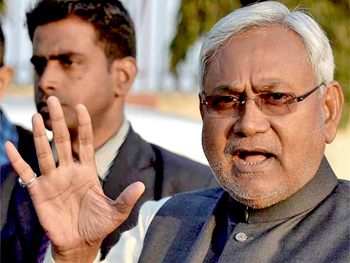Patna, Feb 9: Former Bihar Chief Minister Nitish Kumar today staked claim to form government before Bihar Governor Keshari Nath Tripathi, submitting letters of support of 130 MLAs.

Emerging from Raj Bhawan after an hour-long meeting with the Governor, Kumar said that if opportunity is denied to him to form government or in the event of any 'dilly dallying', he would parade 130 MLAs of JD(U), RJD, Congress, CPI and one independent before President Pranab Mukherjee in Delhi.
The JD(U) legislature party chief, who was accompanied by RJD President Lalu Prasad and Sharad Yadav, said he had told the governor that he was ready to prove his majority in 24 hours or 48 hours, whatever the deadline the Governor may chose to give.
He said they requested the governor that a new government should be in place before the budget session of the Assembly starting from February 20.
The three leaders described the meeting as "satisfactory". Just hours before, the JD(U) expelled Chief Minister Jitan Ram Manjhi, who has refused to quit to allow Nitish's accession, from the party for indiscipline.
The governor was also told that the 130 MLAs supporting Kumar were waiting outside Raj Bhawan wearing their I-cards issued by the assembly secretariat and if he wished he could meet them, Kumar said, adding, "on this, the Governor said 'There is no need of it."
Kumar said he had pointed out reasons to the Governor for having a government in place before the assembly budget session, which was starting from February 20 when Tripathi would have to address a joint session of the two houses on opening day.
"Which government's speech will you read? Budget of which government will be taken up during the session ?" Kumar said he asked the Governor.
On the cabinet decision to authorise Manjhi for dissolution of Bihar assembly, Kumar said former minister Vijay Chaudhary apprised the Governor about the cabinet meeting and the manner in which the proposal was rejected by majority of ministers.
"Governor was told that if he wishes he could ask officers about it (the cabinet meeting) to verify the truth," he said





Comments
Add new comment